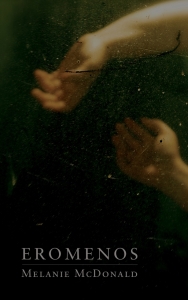
by fljustice | Mar 20, 2011 | Books, Fiction, Free stuff, Interviews
Author Interview: Melanie McDonald
It’s been way too long since I posted an author interview on this blog, but finally found a great candidate. Melanie McDonald just published an acclaimed new literary historical novel Eronemos about Emperor Hadrian’s doomed young lover Antinous. From the back:
 “Eros and Thanatos converge in this story of a glorious youth, an untimely death, and an imperial love affair that gives rise to the last pagan god of antiquity, Antinous.
“Eros and Thanatos converge in this story of a glorious youth, an untimely death, and an imperial love affair that gives rise to the last pagan god of antiquity, Antinous.
In this coming-of-age novel set in second century Rome, the Greek youth Antinous of Bithynia recounts his seven-year affair with Hadrian, the fourteenth Roman emperor. In a partnership more intimate than Hadrian’s political marriage, Antinous captivates the most powerful ruler on the earth.
This version of the story of the emperor and his beloved ephebe envisions the life of the youth who after death achieved apotheosis as a pagan god whose cult of worship lasted for hundreds of years, and gives voice to Antinous, whose image still appears in museums around the world.”
Ms. McDonald not only agreed to an interview, but provided a signed copy as a giveaway (details at the end of the post.)
Faith L. Justice: I’m sure two of the first questions readers have for you is, “How do you pronounce the title?” and “What does it mean?” (more…)

by Faith Justice | Jun 25, 2010 | Essays/Research, Writing
Historical Research Using Internet, Interviews and Site Visits
 In Part I of this two-part series, I talked about using books and libraries in doing historical research. Although print matter is a good place to start, in today’s world you can’t ignore the Internet. But there are two problems: quantity and quality – too much of the former and not enough of the latter. Unlike traditionally published books, which have to go through some screening process (in academic circles that can be quite rigorous), anyone can put anything up on the Net and pass it off as truth. So what’s a good historical fiction writer to do?
In Part I of this two-part series, I talked about using books and libraries in doing historical research. Although print matter is a good place to start, in today’s world you can’t ignore the Internet. But there are two problems: quantity and quality – too much of the former and not enough of the latter. Unlike traditionally published books, which have to go through some screening process (in academic circles that can be quite rigorous), anyone can put anything up on the Net and pass it off as truth. So what’s a good historical fiction writer to do?
Stick to sites that have some stake in maintaining their reputation for accuracy such as universities and historical, archaeological and professional societies. Many sites not only update articles, but blog and tweet as well. Others aggregate the news. The Archaeological Institute of America has a daily update of archaeology in the news. When you find interesting aggregators, subscribe to their RSS feed, get email alerts or tweets when new information is posted. Google also has Google Scholar (click on the “more” button at the Google.com home page) that searches professional and scholarly literature. Many newspapers and local government organizations have digitized their archives and can be a great source of primary material. (Remember your best friend the research librarian? Tap them for help on accessing those databases.)
(more…)

 “Eros and Thanatos converge in this story of a glorious youth, an untimely death, and an imperial love affair that gives rise to the last pagan god of antiquity, Antinous.
“Eros and Thanatos converge in this story of a glorious youth, an untimely death, and an imperial love affair that gives rise to the last pagan god of antiquity, Antinous.
